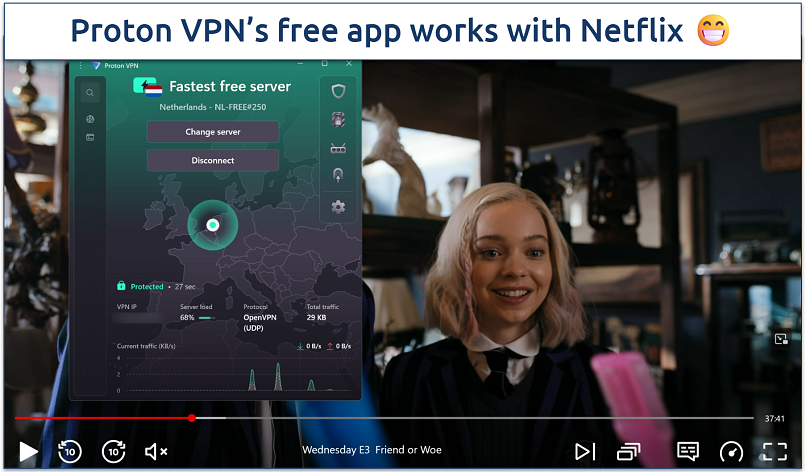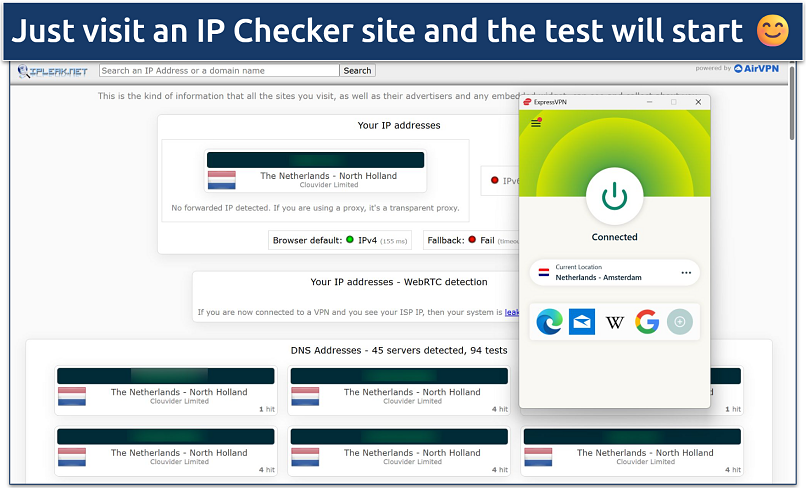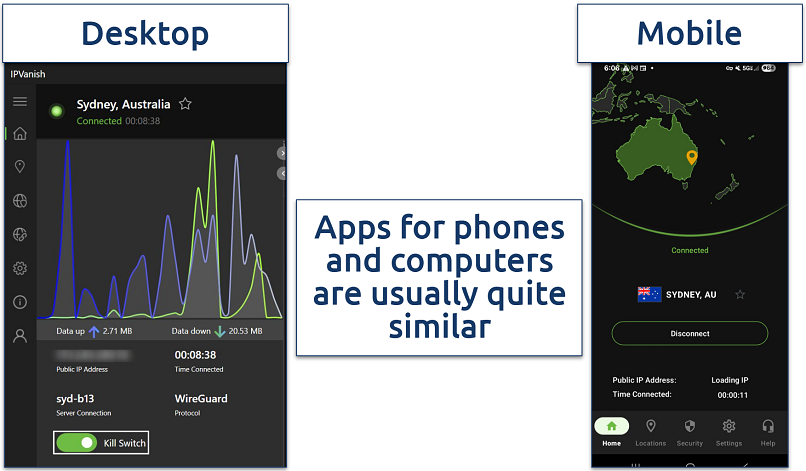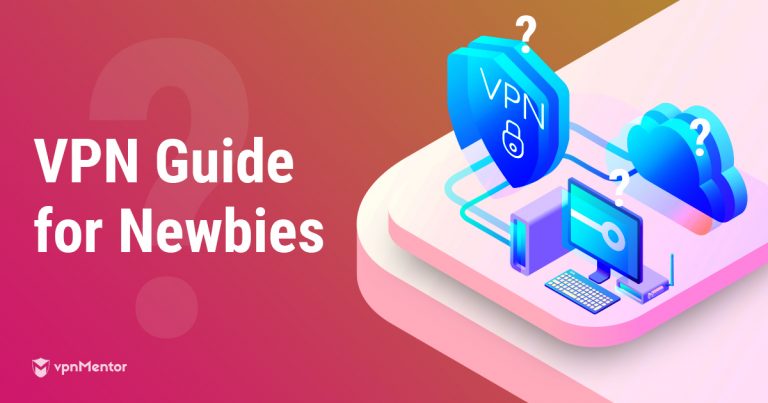What Is a VPN and Do You Actually Need One in 2026?
- Do You Need a VPN?
- How Do You Use A VPN?
- How Does a VPN Keep You Secure?
- What Is a VPN for Phones?
- Are Business VPNs Different From Personal VPNs?
- How Does a VPN Work?
- Are There Any Disadvantages To Using a VPN?
- How Much Do VPNs Cost?
- Can You Use a Free VPN?
- Quick Comparison Table: Best Overall VPNs for Beginners
- FAQs on VPNs
A VPN is a virtual private network that encrypts your connection and assigns you a new IP address by routing your data through one of its servers. So, your online identity and activities are private — essential when using public WiFi. I frequently use a VPN to hide my IP while torrenting, so my ISP (Internet Service Provider) doesn't slow down my connection (throttle).
What would you use a VPN for? This simple app's purpose is to enhance your online security and privacy. It can also be used to access content from anywhere without interruption, such as Netflix, BBC iPlayer, and Hulu. In fact, many people use VPNs for secure streaming, while 39% of Americans use VPNs for work (Exploding Topics, 2025)1. With remote work increasing exponentially, many businesses use VPNs to give digital employees, telecommuters, and remote workers access to their networks.
In this article, I’ll explain precisely how a VPN works, what it can and can’t do, and whether you really need one. I’ll also go into detail on how VPN apps differ across operating systems, and spill the beans on whether free VPNs are actually safe.
Do You Need a VPN?
A VPN is often used as the first line of defence if you’re worried about your online privacy and safety. While a proxy can change your location and anti-virus software can remove malware that’s already on your device, a VPN is the easiest way to encrypt your connection. Encryption scrambles your online data, protecting it from unauthorized access — basically a virtual lock.
Travelers, people who use public WiFi, and anyone suspicious of their ISP/WiFi provider usually benefit the most from using a VPN. Basically, if you’re worried about the networks you’re connecting to, you really should connect to a VPN to get some peace of mind.
However, all VPNs lower your speeds, but with the best ones, the drop is so small it’s hardly noticeable. They rarely take more than 5 minutes to install on any device; you can set them to connect automatically, and they make your data much safer without extra day-to-day effort.
My favorite VPNs offer free trials, and most have extended money-back guarantees, so it's easy to test them risk-free and get a refund if they're not for you. Here's a quick breakdown of what a VPN can and cannot do, so you can decide whether trying one will benefit you.
| What a VPN Does | What a VPN Can't Do |
| ✅ Encrypt your connection and hide your IP address. This enables you to use unsecured Wi-Fi more safely. |
❌ Make you completely anonymous. It’s still possible to be identified by cookies, login details, browser fingerprinting, and other methods if you’re not careful. |
| ✅ May reduce targeted throttling. For example, when your ISP slows down your traffic because it sees you're torrenting and consuming high bandwidth. |
❌ Regularly increase your speeds. It’s highly unlikely that a VPN will increase your speeds (especially ping and upload rates). This will only occur if your ISP has been throttling your speeds. |
| ✅ Protect you from government surveillance and corporations looking to harvest your data. |
❌ Protect you from malware. A VPN can’t stop you from downloading malicious files. However, many of them do come with ad and malware blockers, which we recommend activating. |
| ✅Change your IP address to make it appear that you're in another country. |
❌Bypass account or payment region rules. Your billing address, GGPS, or SMS checks still reveal your real location. This makes it tricky to purchase a service unavailable in your country. Using a virtual gift card is usually a good workaround. |
VPNs Offer Encryption
A VPN encrypts your connection when you connect to its private servers. To put it briefly, encryption uses a secret key (or code) to transform your regular data. It's not possible to read it without the original key, which can be used to decrypt it. This makes your online behaviors and activities unreadable to outsiders. Since most VPNs use military-grade encryption, it’s basically impossible for anyone to see what you’re doing online.
Premium VPNs use AES 256-bit encryption, the strongest available. 256 is the longest encryption key, and the longer the key, the more time it takes to decrypt. It’s used by leading security agencies and governments to protect highly sensitive data.
VPNs Hide Your Actual Location
Your actual IP address is visible without a VPN, which means unwanted parties can use it to determine where you really are. (Your IP address is like your phone number, but for your internet connection.) This is dangerous when combined with other personal data, as it makes you easier to identify, leaving you vulnerable to online attacks. Intrusive parties like advertisers can also use this information to target you with ads, while your ISP could store it and hand it over without your knowledge.
VPNs Can Safely Access Streaming Platforms From Anywhere
With a VPN, it’s possible to securely stream Amazon Prime Video, Disney+, HBO Max, and more from anywhere. As you already know, VPNs reduce your speeds, which can result in buffering, long load times, or even an error screen. However, the best streaming VPNs provide a smooth, 4K experience — we test them regularly to confirm they work with the most popular platforms.
Can you use a VPN for Netflix? Yes, you can use a VPN for Netflix; a recent study found that 56% of VPN users activate the app when watching Netflix (99 Firms, 2025)2.
 It comes with unlimited data usage, but there's only one sever
It comes with unlimited data usage, but there's only one sever
Just be aware that many streaming sites attempt to block VPNs. This is because they have specific licensing agreements in different regions, and they don’t want their content streamed from an unlicensed location. Specific VPNs can avoid these blocks by constantly updating their servers or offering obfuscation (a feature that hides VPN use from restrictive networks).
Use a VPN To Torrent and Play Online Games With Greater Security
When you torrent or play online games, you connect to a ton of other people with access to your device. That’s why it’s a good idea to use a VPN, because it’s never smart to trust random people on the internet. Unfortunately, I’ve had to learn that the hard way. You definitely don’t want to go through a DDoS attack or get doxed, ever.
Just like with streaming, some VPNs are better suited to torrenting. Often, this is because they include features such as port forwarding, which can improve seeding and download speeds. They may also come with torrenting-optimized servers or allow you to engage with P2P on any server. To be clear, my team and I oppose all forms of copyright infringement and encourage you to torrent only content in the public domain.
Other VPNs are set up to minimize lag when gaming. The key factor in gaming is your ping rate. This number shows how long it takes your data to travel. You’ll want a ping below 85ms while gaming, and that's usually only achievable with a nearby VPN server.
Some VPNs Can Block Ads and Malware
Premium VPNs include ad, tracker, and malware blockers, providing additional security. In my experience, the best blockers of this type rival standalone products with similar functions. However, they can’t work miracles. I was super disappointed the first time I encountered ads on YouTube while using my VPN. But, realistically, there aren’t any legit blockers out there that can remove everything.
How Do You Use A VPN?
- Download and install it.
After you pick a VPN, you’ll need to register for an account and pay for it. This will give you access to its installation file. - Connect to a server.
Most modern VPNs have a large power button on their home screen that you can tap to automatically connect to a server. You’ll almost always have faster speeds the closer the VPN server is to your location. - Browse the internet with added security.
You can now go about your normal activities knowing you’re much safer from hackers, governments, your ISP, and anyone else snooping around online.
How Does a VPN Keep You Secure?
A VPN’s main security functions are to encrypt your connection and route your traffic through a private server. You're usually sharing a VPN server's IP address with other users as well, which adds another layer of anonymity since a single IP can't be linked to a single user.
These are just the essential functions that every VPN should offer. Below, I’ve summarized a few additional ways a VPN can keep you safe online.
Privacy Features
Getting a VPN that’s serious about your privacy is crucial because it has full access to your online activity. The most important privacy feature is a strict no-logs policy, which guarantees your VPN won’t track or collect your data. It means there won’t be anything to hand over if government authorities request it as part of an investigation or if its servers are compromised.
After testing VPNs for years, I highly recommend at least skimming a VPN’s privacy policy to make sure it promises not to store your IP address or browsing history. Many VPNs claim to be no-logs VPNs, but only some actually are. The most trustworthy VPNs undergo regular audits, in which security companies assess the VPN's privacy policy against its actual practices. This ensures the VPN provider actually keeps its promises to keep your data private.
Do data breaches affect VPNs? Yes, data breaches can affect VPNs; one of the most famous data breaches occurred in 2016 when Yahoo admitted 3 billion of its user accounts were compromised (NordVPN, 2025)3. While VPNs should be more secure than most other companies, I’m sure Yahoo thought they were safe, too. I strongly encourage you to read up on your chosen provider’s history and, if available, ask its live chat team how it protects its data.
Data Leak Prevention
All reputable VPNs offer DNS/IP leak protection to prevent your personal data from being exposed online. Keeping your IP address and DNS settings private prevents third parties from obtaining sensitive information, such as your location and browsing activity.
It’s easy to test your VPN for DNS/IP leaks. Simply head over to a website like ipleak.net after connecting to a server. Then, wait for a few seconds until it reveals the IP address your device is linked to. As long as it only shows you the VPN's IP address, you’re protected.
 In this test, ExpressVPN hid my US location successfully
In this test, ExpressVPN hid my US location successfully
Another way a VPN protects you from accidental data leaks is through the kill switch function. A kill switch automatically blocks your internet access if your VPN connection fails, preventing any data leaks from occurring while the VPN is disconnected. This feature is especially important when torrenting or using a public WiFi network. In my opinion, there’s no point in using a VPN that doesn’t offer this feature. It’s a necessary failsafe, and I don’t feel comfortable without it.
Secure Connections
VPNs use protocols to determine how data is transmitted between your device and the VPN server. They’re a set of rules that determine security and stability. A decent VPN will let you choose from different protocols, each offering a different balance of speed and security. Some are more advanced and better than others, so selecting the right one is essential.
Here are some of the most common protocols of a VPN (ordered from safest to least secure):
- OpenVPN. An open-source protocol that’s well-known for its reliability and security. Being open source means its code is public, and anyone can propose modifications to make it more secure. It’s very popular and encrypts usage on both ends, meaning only the sender and receiver have the encryption key.
- Lightway (ExpressVPN). A fast and secure protocol that is also specifically optimized for mobile devices. It’s lightweight, so it drains less battery, and it can quickly connect and disconnect to mobile or WiFi networks. ExpressVPN now also offers the even faster Lightway Turbo that won't compromise your security — available on Windows.
- NordLynx (NordVPN). Built on the speedy WireGuard, but fixes the vulnerabilities by using double-NAT technology, so your IP address won't be saved.
- WireGuard. Another open-source protocol that’s faster than OpenVPN and just as secure. It’s highly recommended for HD streaming, gaming, and video calls. But it might have some undiscovered vulnerabilities because it’s still relatively new.
- IKEv2. A reliable protocol that has similar speeds to OpenVPN. It can protect you while you change from a mobile network to WiFi because it’s very stable. However, it’s less secure than OpenVPN and WireGuard, so it’s best used as a backup option.
- SSTP. An older protocol for Windows that’s similar to OpenVPN because only the receiver and sender can decrypt the connection. It’s good for bypassing network restrictions, but its speeds aren’t great.
- L2TP/IPSec. An outdated protocol that’s mainly used on smartphones. It doesn’t provide encryption, and its speeds are slow, so you should avoid it.
What Is a VPN for Phones?
Just about every popular VPN offers apps for Android and iOS. You shouldn’t have to pay any extra for this. The main difference is that you download and install them through your app store rather than via the VPN’s website.
This might be obvious, but I was really happy when I found out that they encrypt connections over both mobile and WiFi networks (and you don’t have to do anything special when you switch). Many VPNs also offer free trials (usually up to 7 days) when downloading mobile apps.
 Mobile apps sometimes lose a few features, like extra protocols
Mobile apps sometimes lose a few features, like extra protocols
Are Business VPNs Different From Personal VPNs?
Business VPNs are pretty different from personal VPNs, and they cost much more. For one, they’re usually used to make remote access to the company’s infrastructure safer. They also typically include management tools, so a supervisor can quickly manage multiple VPN accounts distributed among their employees.
Keep in mind that they’re optimized for teams, so they’re not well-suited for personal activities like streaming, gaming, or torrenting. How common is it for businesses to use VPNs? These days, it’s super common; some studies suggest up to 93% of organizations use VPNs for work (Windscribe, 2025)4. It shouldn’t be surprising since there’s a lot at stake. If your company isn’t using VPNs yet, I recommend you tell your boss about them. Once they agree to your brilliant idea, ask them for a raise!
How Does a VPN Work?
Here's an explanation of how a VPN works in a few steps:
- When you connect to the VPN app, it creates a secure and encrypted connection between your device and the chosen server. It's like building a secret tunnel for your internet traffic.
- Your traffic is sent through this encrypted tunnel to the VPN server that acts as a middleman between your device and the websites you want to access. It masks your real IP address and assigns you a temporary one associated with the server's location.
- Your encrypted data travels from the VPN server to the destination website or service, making it difficult for others to spy on or intercept your online activities.
- The website or service sends the requested information back to the VPN server, which encrypts and sends it back to your device through the secure tunnel.
- Your device receives the encrypted data, and the VPN software decrypts it, making it readable for you to access.
Are There Any Disadvantages To Using a VPN?
First of all, you should know that the benefits of using a VPN strongly outweigh any potential disadvantages. That said, there are a few things you should be aware of before connecting to a VPN server.
- It might reduce your speed. Some VPNs will slow your internet speeds more than others. This is due to encryption and the distance your data travels to reach the VPN server — the further the server, the bigger the slowdown in most cases. However, the best VPNs have fast servers to keep speed loss minimal.
- Some VPNs can compromise your privacy. Free VPNs are especially guilty of this, but even some paid VPNs have been caught lying about being “no-logs” VPNs. It’s best to choose a VPN that adheres to a strict no-logs policy that’s been independently audited by security firms.
- VPNs cost money. It’s no secret that VPNs are services that charge ongoing fees. However, most VPNs are only a few dollars per month, so they’re really affordable. Plus, they usually offer money-back guarantees that let you test out the service first and get a refund within a specific timeframe.
- Poor VPNs have limited server and IP address pools. Some VPNs have small server networks or outdated infrastructures. If a VPN doesn’t update its IPs and servers, you’ll likely run into poor connections and limited capabilities.
- Some countries restrict or ban VPNs. Certain countries, such as China, Russia, and Iran, either limit or outright ban VPNs, so using one in these locations can be risky or even illegal. These countries also usually block VPN websites entirely. My team and I don’t condone using a VPN illegally, so be sure to read up on the local law and use VPNs responsibly.
How Much Do VPNs Cost?
The cost of a VPN can vary significantly from one service to another, depending on multiple factors, including the VPN itself — reputable VPNs offering advanced features are typically more expensive.
Plus, you usually get different prices depending on how long you want to commit to the VPN. You can get significant discounts and savings on yearly and 2-year options. Although there’s one small catch — you have to pay the entire offer upfront.
Generally speaking, a VPN shouldn’t cost you more than $8 a month if you choose to purchase annually. If you want a month-to-month VPN, prices can reach $13 or more, depending on the VPN. Unless you’re looking for a short-term VPN service, I don’t recommend paying monthly, as these costs quickly add up.
Here's a quick comparison of prices for some of the top VPNs:
| VPN | Monthly Price on Long-Term deals |
| ExpressVPN | $2.44/month |
| CyberGhost | $2.03/month |
| Private Internet Access | $2.03/month |
| NordVPN | $2.99/month |
| Surfshark | $1.99/month |
| IPVanish | $2.19/month |
| PrivateVPN | $2.00/month |
| Proton VPN | $2.99/month |
| Hotspot Shield | $7.99/month |
Can You Use a Free VPN?
You’ll always face severe limitations with a free VPN, and some can even put your data at risk. First, they usually only offer a small number of servers. This also leads to overcrowding, and the more people use a server, the slower it becomes. On top of slow speeds and limited bandwidth, most free VPNs also have data caps that may limit you to streaming for only 2 hours per month.
The worst free VPNs make up for their lack of revenue by selling your data or adding malware to your device. This is why I recommend using only free VPNs that also offer premium options (also known as freemium VPNs). That lets you know they still have a reputable way to make money, and it’s less likely they’ll resort to shady tactics. Even better, take a look at this list of honest free VPNs to avoid getting stuck with a sketchy one.
Quick Comparison Table: Best Overall VPNs for Beginners
There are a ton of great VPNs out there, but they’re not all set up for new users. Some VPNs I love, like Private Internet Access, are very customizable, but this can make them a bit intimidating to first-time customers. That’s why I’ve compiled a list of my favorite VPNs to share with newcomers. They’re all extremely safe, privacy-friendly, and can be easily connected on your phone or laptop without forcing you to wade through complex setup guides.
Check out this table to see how the best VPNs for beginners compare:
Note. Baseline refers to speed without the VPN connected. You'll notice sometimes the VPN even improves our speed (like ExpressVPN), which is possible when your ISP throttles your connection.
FAQs on VPNs
References
- https://explodingtopics.com/blog/vpn-stats
- https://99firms.com/research/vpn-statistics/
- https://nordvpn.com/blog/biggest-data-breaches/
- https://windscribe.com/blog/vpn-statistics-trends/
Your online activity may be visible to the sites you visit
Your IP Address:
216.73.216.137
Your Location:
US, Ohio, Columbus
Your Internet Provider:
Some sites might use these details for advertising, analytics, or tracking your online preferences.
To protect your data from the websites you visit, one of the most effective steps is to hide your IP address, which can reveal your location, identity, and browsing habits. Using a virtual private network (VPN) masks your real IP by routing your internet traffic through a secure server, making it appear as though you're browsing from a different location. A VPN also encrypts your connection, keeping your data safe from surveillance and unauthorized access.




Please, comment on how to improve this article. Your feedback matters!